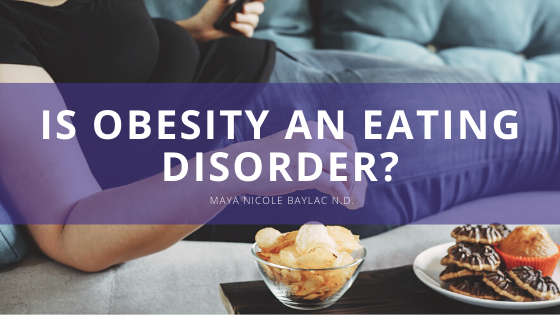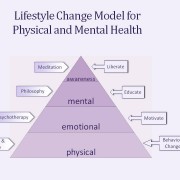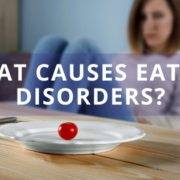Is Obesity an Eating Disorder?
Obesity is defined by a Body Mass Index (BMI) greater than 30 and it is considered a medical condition. Eating disorders on the other hand, are characterized by an abnormal relationship with food and is categorized as part of mental health. Eating disorders display a wide array of behaviors associated with food such as restriction, loss of control or purging, but eating disorders are also associated with a multitude of negative attitudes towards the self, a poor body image or poor self-esteem or shame and self-destructive feelings. Looking closer at the behavioral components of obesity we find a lot of psychological similarities between obesity and bulimia and binge eating. Therefore, a successful treatment of obesity requires a psychosocial approach similar to the treatment of eating disorders.
Behaviors and psychological factors common to both obesity and eating disorders:
- overeating
- snacking
- emotional eating
- dieting
- binging
- compulsive eating
- unconscious eating
- loss of control over food
- food addiction
Overeating can manifest in any of the following scenarios:
- Overeating is the result of eating large quantities of food or calorie dense foods in one sitting. It is also the result of ignoring or not receiving the signals of satiety. For example, a breakfast consisting of four eggs, bacon, potatoes, cheese and milk will contain excessive calories that the body will have to store as fat.
- Overeating can happen by snacking throughout the day and not leaving enough time between meals.
- Overeating can be the consequence of restricting caloric intake and then eating too large a quantity of food in one sitting.
- Emotional eating: suppressed tears tightens the diaphragm. Anxiety may be experienced as an uncomfortable cramping in the stomach. Most suppressed emotions are connected to the digestive tract and can be interpreted as hunger. Using food to numb an uncomfortable feeling is seen commonly in disordered eating.
- Sadness, resentments, anger, boredom or loneliness are common feelings leading to the misuse of food. The fear of pain or our judgments conditioned by our upbringing leads us to deny these feelings and we use food unconsciously to numb ourselves.
- Food addiction which is facilitated by food availability and visibility in every store possible. Food addiction is the result of conscious manipulation by the food industry which uses products like fat and sugar known for their addictive potential to hook those who don’t have appropriate outlet for their emotions.
- Dieting for weight loss with meal replacement or counting calories, contributes to the obesity epidemic by reinforcing restriction that leads to overindulging. Dieting reinforces the ambivalence about food; attraction, repulsion and restriction contains the seed of binging.
Therapeutic Approach to Disordered Eating Habits
Disordered eating behaviors are all characterized by an abnormal use of food to satisfy needs irrelevant to hunger. Whether it be the fear of being alone, anger, anxiety or stress, the proper therapies have to be put in place to bring awareness to the use of food to deal with emotions in order to achieve proper weight management.
A successful approach to obesity and overweight should include the investigation of the causes as a preamble to weight loss. Treating the cause of obesity is the only guarantee of a successful treatment. A successful treatment would preclude any relapse because it treats the psychological components underlying obesity. The common use of dieting in weight loss programs, is not only a failure in the treatment of obesity but it also reinforces the restrictive behavior leading to its opposite: overeating and binge eating.
A successful treatment to obesity should include:
- Hormone testing: leptin, ghrelin, insulin, thyroid hormones, cortisol
- Other tests to assess possible health effects of obesity: blood sugar, cholesterol, liver enzymes
- Psychotherapy to resolve psychological problems
- Meditation, conscious eating, mindfulness to increase awareness
- Cooking classes, nutritional counseling to educate and increase understanding
- Conflict resolution, couple and family counseling to facilitate resolution
From Nutrition to Gastronomy
Food has long been used as an outlet beyond nutrition. It has been a way to socialize, celebrate special events therefore eating is an important part of the natural rhythms that govern our lives. Culinary arts around the world enhances the natural pleasure of eating and have brought our survival behaviors to a higher level of sophistication. Industrialization of food on the other hand has ruined the meaning of food and taken with it one of the meanings of life on earth.
Processed food has introduced psychopathological behaviors around food. Foods devoid of nutritional value disrupt the normal cycle of hunger and satiety. Foods filled with chemicals, colorants and preservatives disrupt the body’s metabolic function generating dangerous (toxic) fat. Chemicals that are not cleared from the body are most often stored in fat cells which disrupt hormone signaling and can make it hard to lose weight with clean nutrition and an active lifestyle.
Everyone deserves to experience the pleasure of eating and to feel safe with food. We need to reclaim our birth right to connect with nature and with each other through tasty and natural foods that will give us energy, contentment, health and longevity!







